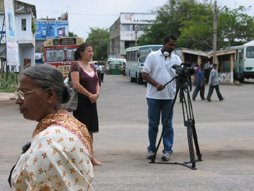To report in Zambia’s rural areas so that peasants can have their voices in the media. To ask inhabitants of a Salvadorian suburb if they really have the new water service their government claims to be one of its biggest achievements. Or to simply broadcast news for children are some examples of street journalism around the world.
These examples do not refer to the type of journalism that aims for breaking news or big scandals.  They refer to the journalism that asks for people’s demands, desires and needs and how they are dealing with them.
They refer to the journalism that asks for people’s demands, desires and needs and how they are dealing with them.
A case of bonded labour in Nepal is one of such examples. In mid 2000, the Nepali government banned it because it had a resemblance of slavery. Some children, whose dead parents owed people, were forced to work for free as a way of paying back their late parents’ debt.
Most of the Nepali media houses, Non-Governmental Organisations and human rights groups,radio station,Radio Sagarmatha, chose to oppose the ban because the bonded workers (Kamaiyas) depended on their employers for survival. After the ban, bonded laborers were kicked out of their homes and lost their source of food.
Radio Sagarmatha reported the labourers’ suffering that arose from government’s failure to address the consequences of its decision. The radio’s reports provoked a huge debate in Nepal that forced government to come up with a programme that saw the labourers receive resettlement packages.
As Petter Ljunggren, editor of Scoop Magazine, a Swedish magazine for investigative journalism, states: “One of the duties of journalists is to dig out the truth. Journalists have left a lot of room for politicians to speak out without searching for the truth. Journalists are usually fed with information instead of digging out information from their own initiatives.” Ljunggen observes that very few media houses are prepared to encourage investigative journalism in their newsrooms because it requires time and financial resources.
“But journalists must learn to take the risk,” says Ljunggen. “We have all the tools and rights to carry out investigative journalism. The problem is that we don’t use all our powers to dig out the truth.”
Photo:-Dushiyanthini Kanagasabapathipillai in Jaffna
(This was posted on http://www.fo.hik.se:16080/jd04/action.html FOJO, Sweden website during the training course on Journalism & Democracy 2004, in Sweden)


0 Comments:
Post a Comment
<< Home